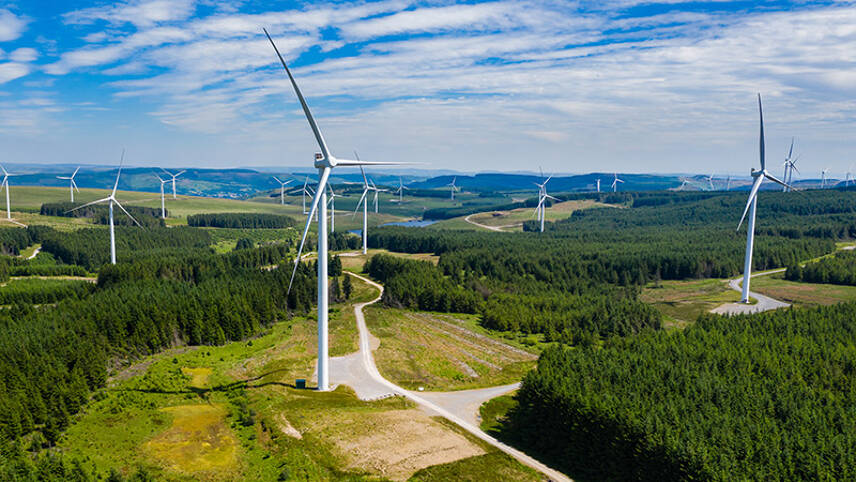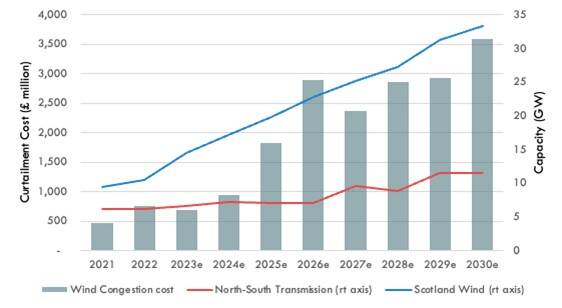Register for free and continue reading
Join our growing army of changemakers and get unlimited access to our premium content

Pictured: The Pen y Cymoedd wind farm
New research, published on Thursday (15 June) by financial think tank Carbon Tracker found that unresolved bottlenecks to do with electricity grid upgrades could add to household energy bills.
The research found that bottlenecks in the transmission system meant that the grid had to pay to stop wind power generation while paying gas stations to increase outputs on more than 200 occasions in 2022.
This added £800m to consumer electricity bills and increased greenhouse gas emissions by 1.3 million tonnes.
The research found that from January 2021 to April 2023, £1.5bn was spent to curtail more than 6.5 TWh of wind power, leading to 2.5m tonnes of emissions that otherwise could have been avoided. In response, gas-fired plants were paid nearly £600m to compensate for the curtailed wind power.
The research warns that upgrades to the grid are being outpaced by the growth of wind projects in the pipeline. The bottleneck could see the cost of inaction more than treble by 2030, costing £3.5bn annually and wasting more than 20% of wind output in Scotland – costing an extra £200 per household.
Carbon Tracker also warns that the waste wind energy means that an additional 6.8m tonnes of carbon emissions could be emitted by 2030. The UK’s offshore wind pipeline alone has reached almost 98GW – up from 91GW this time last year.
Carbon Tracker’s power analyst Lorenzo Sani warned that the current electricity grid is “not fit for purpose” and that significant investment is required to help make it compatible with the net-zero transition.
“Without significant improvement in the permitting timeframes for critical energy transmission infrastructure – the grid can’t support the government’s plans to decarbonise generation by 2035 or deliver on its vision of ‘affordable, homegrown, clean energy,” Sani said.
Currently, the grid can only transmit 6GW of energy across the England-Scotland border, despite Scotland having 10GW of wind farm capacity and accounting for 10% of British electricity demand. Carbon Trackers warns that this “wind congestion” means that gas stations have to be fired up and wind power is wasted.
There are plans to build four new undersea cables between England and Scotland to improve transmission, adding an additional 8GW of new capacity. However, the research warns that bottlenecks in the planning process mean that only two of these cables will be operational by 2030, at which point Scotland could have an additional 28GW of wind power.
This problem will persist, the report claims, unless transmission infrastructure is improved. Carbon Tracker is calling on policymakers to prioritise transmission project delivery and to fast-track permits for initiatives that can improve the grid.
Carbon Tracker recommends building more cables, claiming it is the cheapest and most durable option available. Installing two undersea cables between England and Scotland in addition to the four that are planned would be around £3.7bn but would save £1.7bn annually due to halving wind curtailment.
North Sea exploration wasted
In related news, the Energy and Climate Intelligence Unit (ECIU) has criticised the Government’s focus on North Sea gas field exploration, claiming that if new fields were halted it would have minimal impact on production and energy availability.
The ECIU claims that halting new North Sea gas fields would see production fall by 15% by 2030. This is roughly 30 terawatt-hours (TWh) lower than current levels, which the ECIU equates to the same amount of electricity that could be produced by one offshore wind farm.
The findings, based on statistics from the industry regulator the North Sea Transition Authority (NTSA), also found that installing electric heat pumps in all new homes built from now to 2030 would avoid half as much gas as well.
The ECIU’s energy analyst Jess Ralston said: “There is an opportunity cost in providing tax cuts to oil and gas companies in that you’re not providing those tax cuts elsewhere in the economy. Even with the windfall tax in place, the oil and gas companies are generating record-breaking profits. Meanwhile, renewable investors are warning that they plan to put their money in the US and EU thanks to tax credits on offer there, so the UK is at risk of missing out on private sector cash.
“With more wind farms in place, gas plants will switch on less often meaning the UK needs to find and pay for less gas and is more energy secure. Plans to accelerate offshore wind farms could balance out a moratorium.”
Earlier this week, research also found that the UK’s expanding storage pipeline is “incompatible” with a net-zero grid, due to the need for longer-duration storage projects that are currently being rejected based on costs.



Dare one suggest that Gas, Water and Electricity should not rest with private companies????
I campaign to have all countries cede all of their armed forces in agreed stages, to a democratically elected United Nations, until war becomes impossible; as discussed in the peace treaty between the USSR and USA that ended the Cold War by the US agreeing to cut WMD in return for democracy in Eastern Europe. The money saved can be spent on the climate crisis.